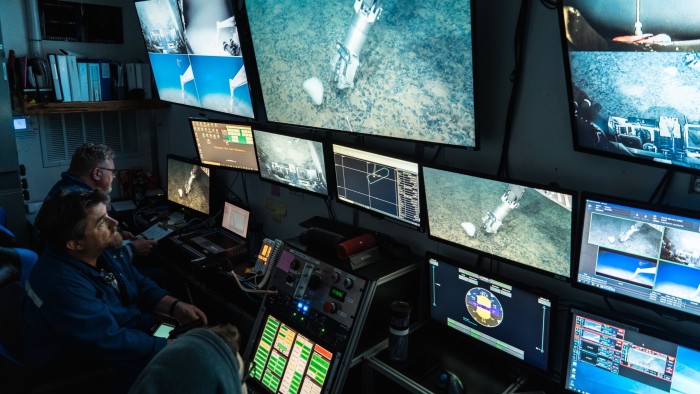Unlock the White House Watch newsletter for free
Your guide to what the 2024 US election means for Washington and the world
Donald Trump’s administration is drafting an executive order to enable the stockpiling of metal found on the Pacific Ocean seabed, in an effort to counter China’s dominance of battery minerals and rare earth supply chains, said people familiar with the matter.
The potato-sized nodules that are formed on the sea floor at high pressure over millions of years contain nickel, cobalt, copper and manganese used in batteries, electrical wiring or munitions, as well as traces of rare earth minerals. They could be added to existing federal stockpiles of crude oil and metals.
The US is seeking to become self-sufficient in these critical minerals. The Trump administration has pushed Ukraine to accept a minerals deal, threatened to seize Greenland and annex Canada, and announced measures to increase domestic production.
Alexander Gray, an Asia expert who was chief of staff to the US national security adviser in the first Trump administration, said it would make sense for the White House to focus on deep-sea mining as China increasingly views the deep seabed as “a front line in economic and military competition with the US”.
“As the Trump administration has done with shipbuilding and critical minerals more broadly, catalysing US government focus on the areas of greatest vulnerability to PRC ambitions is essential,” Gray added, referring to the People’s Republic of China.
A strategic state reserve of so-called polymetallic nodules from the seabed would help the US catch up with China in the global race to explore the resource-rich floor of the Pacific. Beijing last week placed export restrictions on some rare earth elements in its latest attempt to use the metals as a form of economic coercion.
The stockpile is being considered as part of a broader push to fast-track deep-sea mining applications under US law, and to create onshore processing capacity for nodules, the people familiar with the plans said.

Influential Republicans, including secretary of state Marco Rubio and national security adviser Mike Waltz, have been strong advocates when they served in Congress. The annual defence budget bill last year instructed the department to conduct a feasibility study on how the nodules could be refined for defence applications.
“It’s moved beyond a commercial question,” said a House aide. “This is a Chinese strategic capability built up for decades such that it could be weaponised.”
Under the plans the stockpile would “create large quantities ready and available on US territory to be used in the future”, in case of a conflict with China that would constrain imports of metals and rare earths, another person familiar with the matter said.

Despite enthusiasm among top Republicans for exploring the seabed, the US has continued under Trump to be largely absent from international negotiations on seabed mining. It has not ratified the treaty that first established the legal framework for these activities, the 1982 United Nations Convention on the Law of the Sea.
Talks at the International Seabed Authority in Jamaica last month ended without a go-ahead for mining in international waters, as dozens of countries continue to call for a moratorium on the practice.
Opponents argue mining could harm the poorly understood life forms that live thousands of metres below the surface, including corals and white octopuses. They also question whether the industry could ever recreate China’s extensive supply chain of critical minerals, and compete with the low price of Indonesian nickel.
The Metals Company, a Vancouver-based frontrunner, said during the talks that its US subsidiary had initiated a process overseen by the US Department of Commerce to apply for permits to explore and mine international waters under a 1980 US law. TMC’s chief executive Gerard Barron told the Financial Times the ISA did not have an “exclusive mandate” to regulate mining in international waters.
“You can’t give rights to something you have no jurisdiction over, pursuant to a treaty you are not a part of,” countered Jose Fernandez, a top economic envoy under former president Joe Biden, with a focus on minerals security. “So the lawyer in me tells me that companies will want to be careful proceeding without a permit from the ISA.”
The US commerce department did not reply to a request for comment. The White House NSC declined to comment.
Illustration and data visualisation by Ian Bott



